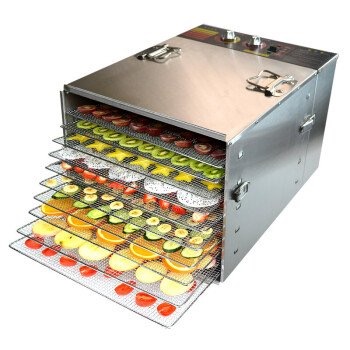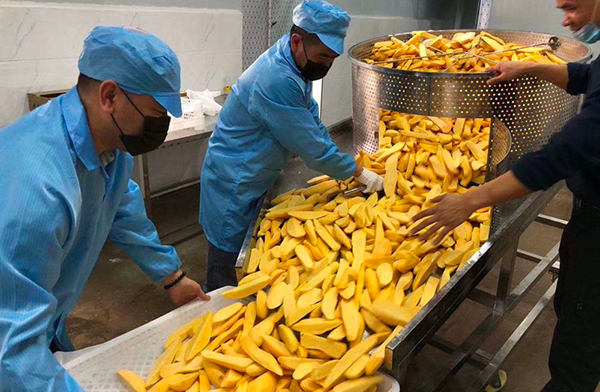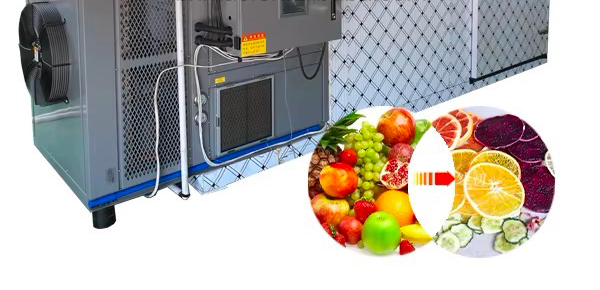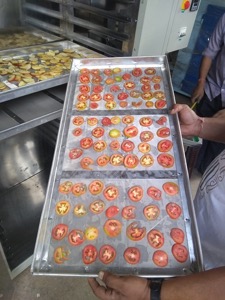
Content Menu
● Introduction
● What Is a Heat Pump Dryer?
>> Heat Pump Dryer Process
● How Does a Small Heat Pump Dryer Save Energy?
>> 1. Energy Efficiency
>> 2. Lower Operating Temperatures
>> 3. Reduced Drying Time
● Advantages of Using Small Heat Pump Dryers
>> 1. Cost-Effectiveness
>> 2. Nutritional Preservation
>> 3. Environmental Benefits
>> 4. Versatility
>> 5. Ease of Use
>> 6. Compact Design
>> 7. Improved Product Quality
>> 8. Safety Features
● Applications in Food Processing
>> Case Study: Dried Fruit Production
● Challenges and Considerations
>> 1. Initial Investment Cost
>> 2. Technical Knowledge Required
>> 3. Space Requirements
>> 4. Regular Maintenance Needs
● Conclusion
● Related Questions
>> 1. What types of foods can be dried using a small heat pump dryer?
>> 2. How much energy can I save by using a small heat pump dryer?
>> 3. Are there any maintenance requirements for small heat pump dryers?
>> 4. How does a small heat pump dryer compare to traditional dryers?
>> 5. Can I install a small heat pump dryer anywhere?
Introduction
In recent years, the demand for energy-efficient appliances has surged, particularly in the food processing industry. One such innovation is the small heat pump dryer, which offers a cost-effective solution for drying food products while significantly reducing energy consumption. This article explores how a small heat pump dryer can save you money on energy bills, the technology behind it, its advantages over traditional drying methods, and its applications in food processing.

What Is a Heat Pump Dryer?
A heat pump dryer is an advanced drying system that utilizes a refrigeration cycle to remove moisture from food products. Unlike conventional dryers that rely on high temperatures to evaporate moisture, heat pump dryers operate at lower temperatures, making them more energy-efficient and better for preserving the quality of food.
The process involves drawing in ambient air, heating it using a compressor, and circulating it through the drying chamber. As the warm air absorbs moisture from the food, it is cooled down in an evaporator, where the moisture condenses and is removed. The cooled air is then reheated and recirculated back into the drying chamber.
Heat Pump Dryer Process
This cycle allows for continuous operation without significant energy loss. The closed-loop system minimizes waste and ensures that most of the energy used goes directly into drying the food. The efficiency of this process is one of the key reasons why small heat pump dryers are becoming increasingly popular in both commercial and residential settings.
How Does a Small Heat Pump Dryer Save Energy?
1. Energy Efficiency
Small heat pump dryers are designed to be highly energy-efficient. They can reduce energy consumption by up to 50% compared to traditional dryers. This efficiency is achieved by recycling heat within the system instead of venting it outside. The closed-loop system minimizes energy loss and ensures that most of the energy used goes directly into drying the food.
2. Lower Operating Temperatures
Heat pump dryers operate at lower temperatures (typically between 30°C to 70°C), which not only preserves the nutritional value of food but also reduces energy consumption. Traditional dryers often operate at high temperatures, which can lead to significant energy waste. By maintaining lower temperatures, heat pump dryers prevent overheating and over-drying, which can compromise food quality.
3. Reduced Drying Time
Despite operating at lower temperatures, small heat pump dryers can achieve effective drying results in a shorter time frame compared to traditional methods. The ability to control humidity and temperature precisely allows for optimal drying conditions, increasing throughput and reducing overall energy costs. This efficiency translates into faster processing times for businesses, allowing them to meet demand without sacrificing quality.
Advantages of Using Small Heat Pump Dryers
1. Cost-Effectiveness
The initial investment in a small heat pump dryer may be higher than that of traditional dryers; however, the long-term savings on energy bills make it a cost-effective choice for businesses. The reduced operational costs can lead to significant savings over time. Additionally, many manufacturers offer financing options or incentives for businesses looking to upgrade their equipment.
2. Nutritional Preservation
One of the standout features of small heat pump dryers is their ability to preserve the nutritional quality of food products. The lower drying temperatures help retain vitamins and minerals that are often lost in traditional drying processes. This preservation not only benefits consumers but also enhances product quality for manufacturers looking to market their goods as healthy options.
3. Environmental Benefits
By consuming less energy, small heat pump dryers contribute to lower greenhouse gas emissions and a reduced carbon footprint. This makes them an environmentally friendly option for businesses looking to enhance their sustainability efforts. Many companies are now prioritizing eco-friendly practices as part of their corporate social responsibility initiatives, making heat pump dryers an attractive choice.
4. Versatility
Small heat pump dryers are versatile and can be used for a wide range of food products, including fruits, vegetables, meats, and herbs. Their ability to operate at controlled temperatures makes them suitable for delicate items that require gentle drying. This versatility allows businesses to diversify their product offerings without needing multiple drying systems.
5. Ease of Use
Most small heat pump dryers come equipped with advanced features such as smart controls and customizable drying programs. These features allow operators to monitor and adjust drying parameters easily, ensuring optimal performance with minimal manual intervention. User-friendly interfaces often include touch screens and programmable settings that enhance operational efficiency.

6. Compact Design
The compact design of small heat pump dryers makes them ideal for facilities with limited space. Unlike bulky traditional dryers that require significant floor space and ventilation systems, small heat pump dryers can fit into smaller areas while still delivering high performance. This is particularly beneficial for small businesses or startups looking to maximize their operational efficiency without extensive investments in infrastructure.
7. Improved Product Quality
By controlling temperature and humidity levels during the drying process, small heat pump dryers help maintain product integrity better than conventional methods. This results in higher-quality dried foods with improved texture, color retention, and flavor profiles—key factors that influence consumer preference.
8. Safety Features
Modern small heat pump dryers often come equipped with safety features such as automatic shut-off systems when doors are opened or if overheating occurs. These safety measures not only protect operators but also ensure that food products are processed under safe conditions.
Applications in Food Processing
Small heat pump dryers are increasingly being adopted in various sectors of the food industry due to their efficiency and effectiveness:
- Fruits and Vegetables: Ideal for drying fruits like apples, bananas, and vegetables such as carrots and bell peppers without compromising their nutritional value.
- Herbs: Perfect for preserving the aroma and flavor of herbs like basil, thyme, and oregano.
- Meats: Suitable for producing dried meats such as jerky while maintaining safety standards through controlled drying environments.
- Seafood: Effective for drying fish and seafood products while preventing spoilage.
- Snack Foods: Increasingly used in producing healthy snack alternatives like dried fruit chips or vegetable crisps that appeal to health-conscious consumers.
- Bakery Products: Small heat pump dryers can also be utilized in dehydrating certain bakery items or creating unique textures in snacks.
Case Study: Dried Fruit Production
Consider a company specializing in dried fruit production using a small heat pump dryer:
1. Initial Setup: The company invests in a compact heat pump dryer capable of processing various fruits.
2. Energy Savings: By switching from traditional hot air drying methods to a small heat pump dryer, they notice a reduction in energy costs by approximately 40%, allowing them to allocate resources elsewhere.
3. Quality Improvement: The company reports improved color retention and flavor profiles in their dried fruits compared to previous batches processed with traditional methods.
4. Market Expansion: With enhanced product quality and lower operational costs, they expand their market reach by offering premium dried fruit products.
5. Customer Feedback: Positive customer feedback regarding taste and texture leads to increased sales volume.
This case highlights how adopting modern technology can lead to tangible benefits across multiple business facets—from cost savings to product differentiation.
Challenges and Considerations
While there are numerous advantages associated with small heat pump dryers, there are also some challenges that potential users should consider:
1. Initial Investment Cost
Although long-term savings can offset initial costs, businesses must be prepared for higher upfront expenses compared to conventional dryers.
2. Technical Knowledge Required
Operating advanced equipment like small heat pump dryers may require staff training or hiring skilled personnel familiar with this technology.
3. Space Requirements
While compact compared to traditional models, some configurations may still require adequate space for installation along with proper airflow around the unit.
4. Regular Maintenance Needs
Like all machinery, regular maintenance is essential to ensure optimal performance over time; neglecting maintenance could lead to inefficiencies or breakdowns.
Conclusion
In conclusion, investing in a small heat pump dryer can lead to substantial savings on energy bills while providing numerous benefits for food processing operations. With their energy efficiency, ability to preserve nutritional quality, environmental advantages, versatility in applications, ease of use, compact design, improved product quality, safety features, and significant cost savings over time, small heat pump dryers represent a smart choice for businesses aiming to enhance their productivity while minimizing costs.
As more companies look towards sustainable practices in food processing, small heat pump dryers will undoubtedly play a crucial role in shaping the future of this industry.

Related Questions
1. What types of foods can be dried using a small heat pump dryer?
Small heat pump dryers are versatile and can dry fruits, vegetables, meats, herbs, seafood effectively while preserving their nutritional content.
2. How much energy can I save by using a small heat pump dryer?
You can save up to 50% on energy costs compared to traditional dryers due to their efficient recycling of heat within the system.
3. Are there any maintenance requirements for small heat pump dryers?
Regular maintenance includes cleaning filters and checking for blockages or leaks to ensure optimal performance.
4. How does a small heat pump dryer compare to traditional dryers?
Small heat pump dryers operate at lower temperatures and are more energy-efficient than traditional dryers that rely on high-temperature drying methods.
5. Can I install a small heat pump dryer anywhere?
Yes! One of the advantages of small heat pump dryers is their ventless design, allowing installation in various locations without requiring external venting.
This comprehensive overview illustrates not only how beneficial small heat pump dryers are but also why they should be considered essential equipment for modern food processing operations focused on sustainability and efficiency.
By embracing this technology now more than ever before—companies will not only improve profitability but also contribute positively towards environmental sustainability efforts globally through reduced resource consumption while delivering high-quality dried foods that meet consumer demands effectively!












